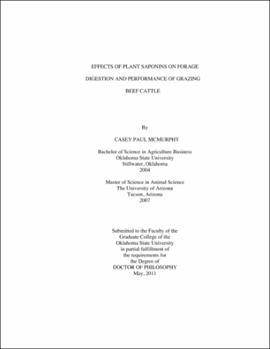| dc.contributor.advisor | Lalman, David L. | |
| dc.contributor.author | McMurphy, Casey Paul | |
| dc.date.accessioned | 2013-11-26T08:22:36Z | |
| dc.date.available | 2013-11-26T08:22:36Z | |
| dc.date.issued | 2011-05 | |
| dc.identifier.uri | https://hdl.handle.net/11244/6610 | |
| dc.description.abstract | The inclusion of Micro-Aid (MA) in protein supplements improved rumen DM and NDF degradability via a decrease in rumen particulate passage rate, but was not successful at improving apparent total tract digestibility. This improvement in rumen digestion may have the potential to increase the supply of nutrients to the small intestine for subsequent improvements in animal performance. Micro-Aid successfully suppressed protozoa after continuous administration, over 20 days, suggesting that complete adaptation to saponins by protozoa was not observed. Also, the reduction in protozoa has been shown to increase microbial efficiency (Veira, 1986) which would be beneficial to lactating cows that have a greater metabolizable protein requirement than cannulated steers or even gestating cows. The inclusion of MA did not impact performance of stocker steers or beef cows during the supplementation period. However, MA did improve calf performance when supplementing cows during early lactation. This advantage was lost due to compensatory gain after supplementation ceased, but could prove to be of great importance to a fall-calving cow herd, consuming low-quality forage for its entire lactation period. There was a non-significant increase in milk yield of 2.4% during early lactation, similar to other findings. Feeding frequency of MA needs to be evaluated as a potential role in animal performance. These performance studies intermittently supplied MA as opposed to a continuous supply. This may negatively impact the microflora populations intermittently and never sustain a stable environment. It would also be beneficial to evaluate the use of MA in combination with non-protein nitrogen. With the rising costs of feed protein, this may be an economical option to upgrade the use of non-protein nitrogen in grazing cow diets. More research needs to be conducted to determine the impact of daily provision of MA and its interaction with diet on performance of grazing animals. | |
| dc.format | application/pdf | |
| dc.language | en_US | |
| dc.rights | Copyright is held by the author who has granted the Oklahoma State University Library the non-exclusive right to share this material in its institutional repository. Contact Digital Library Services at lib-dls@okstate.edu or 405-744-9161 for the permission policy on the use, reproduction or distribution of this material. | |
| dc.title | Effects of plant saponins on forage digestion and performance of grazing beef cattle | |
| dc.contributor.committeeMember | Horn, Gerald W. | |
| dc.contributor.committeeMember | Krehbiel, Clint R. | |
| dc.contributor.committeeMember | Payton, Mark E. | |
| osu.filename | Mcmurphy_okstate_0664D_11292.pdf | |
| osu.accesstype | Open Access | |
| dc.type.genre | Dissertation | |
| dc.type.material | Text | |
| dc.subject.keywords | grazing cattle | |
| dc.subject.keywords | low-quality hay | |
| dc.subject.keywords | micro-aid | |
| dc.subject.keywords | protein supplementation | |
| dc.subject.keywords | saponins | |
| thesis.degree.discipline | Animal Nutrition | |
| thesis.degree.grantor | Oklahoma State University | |
